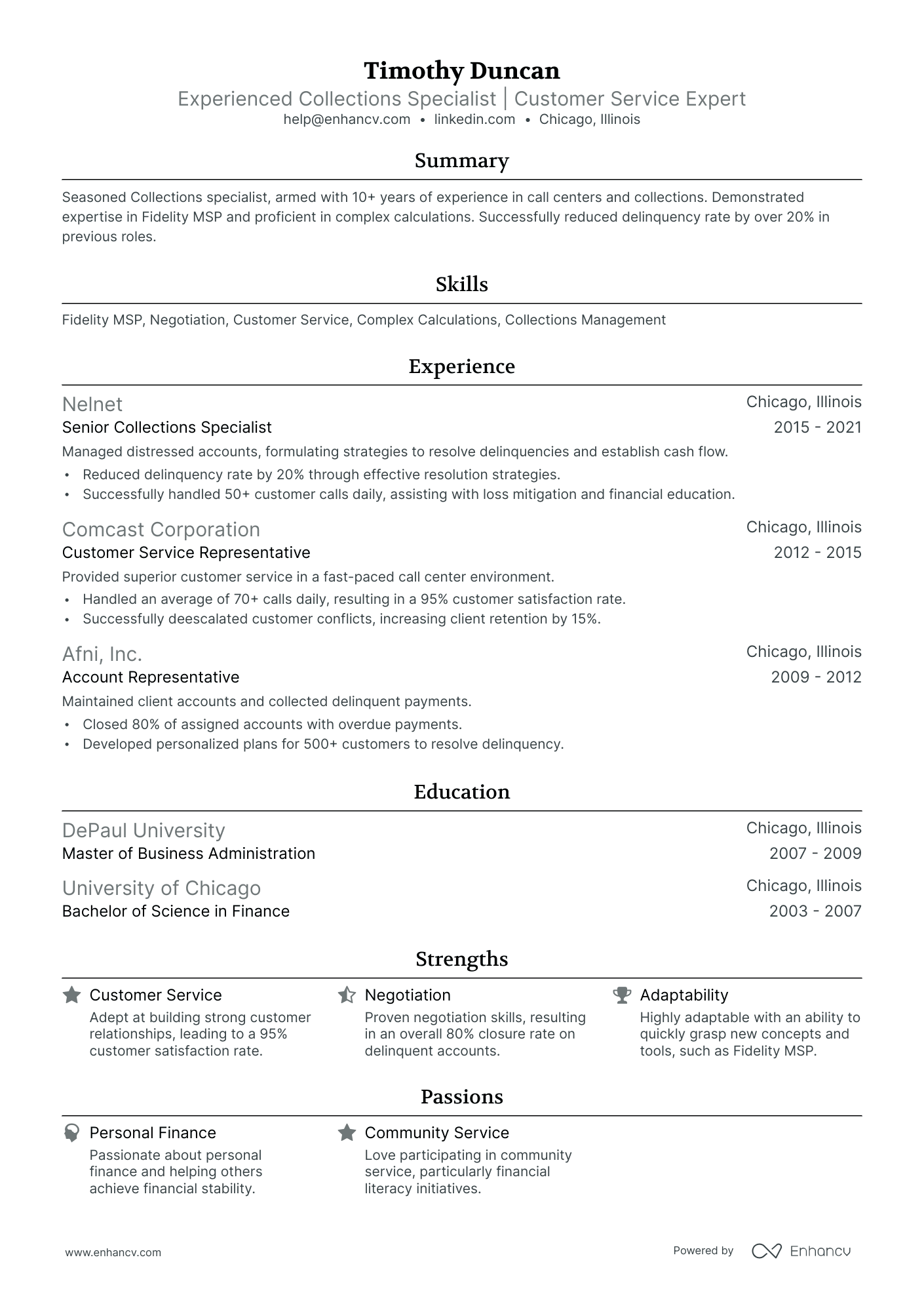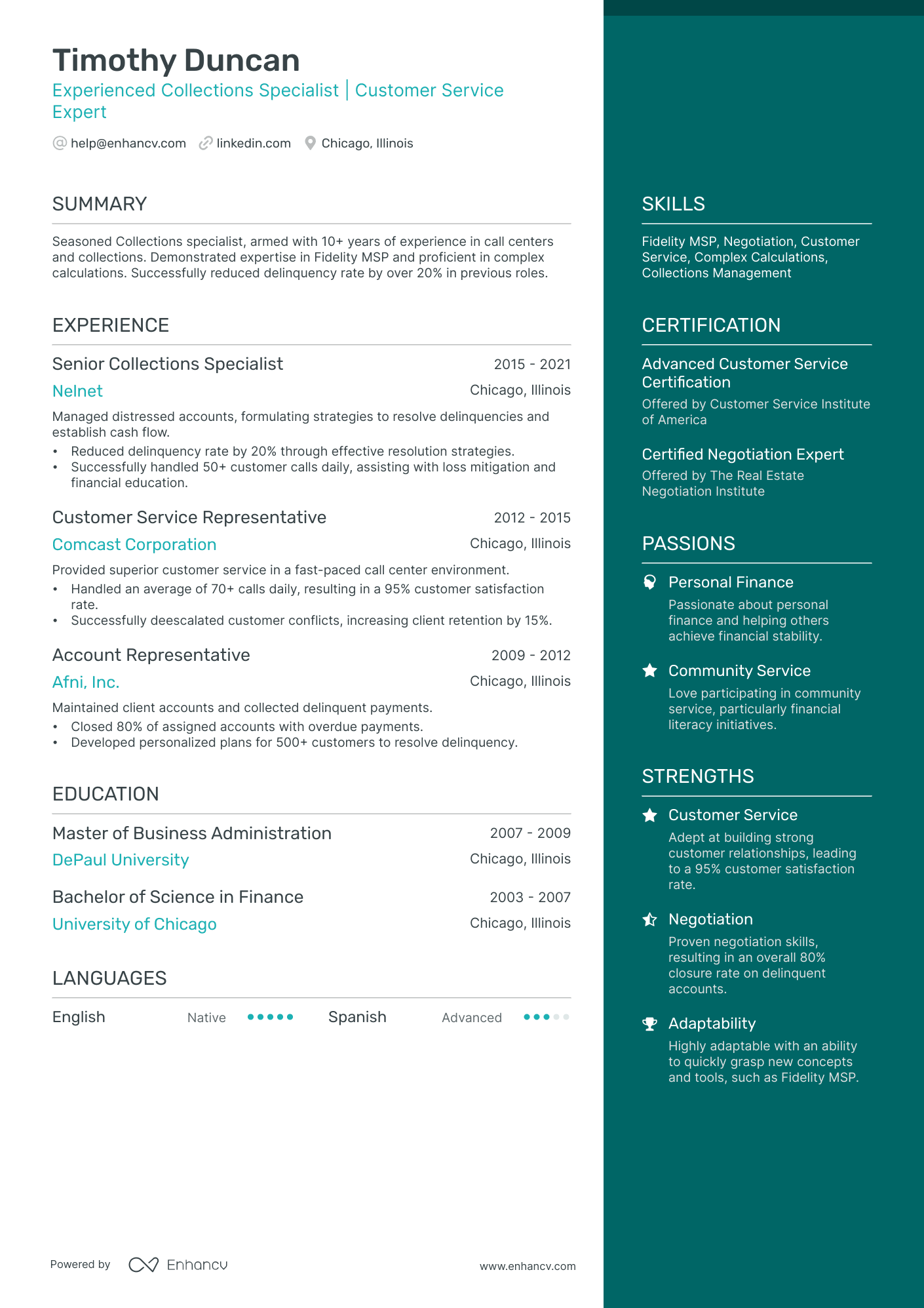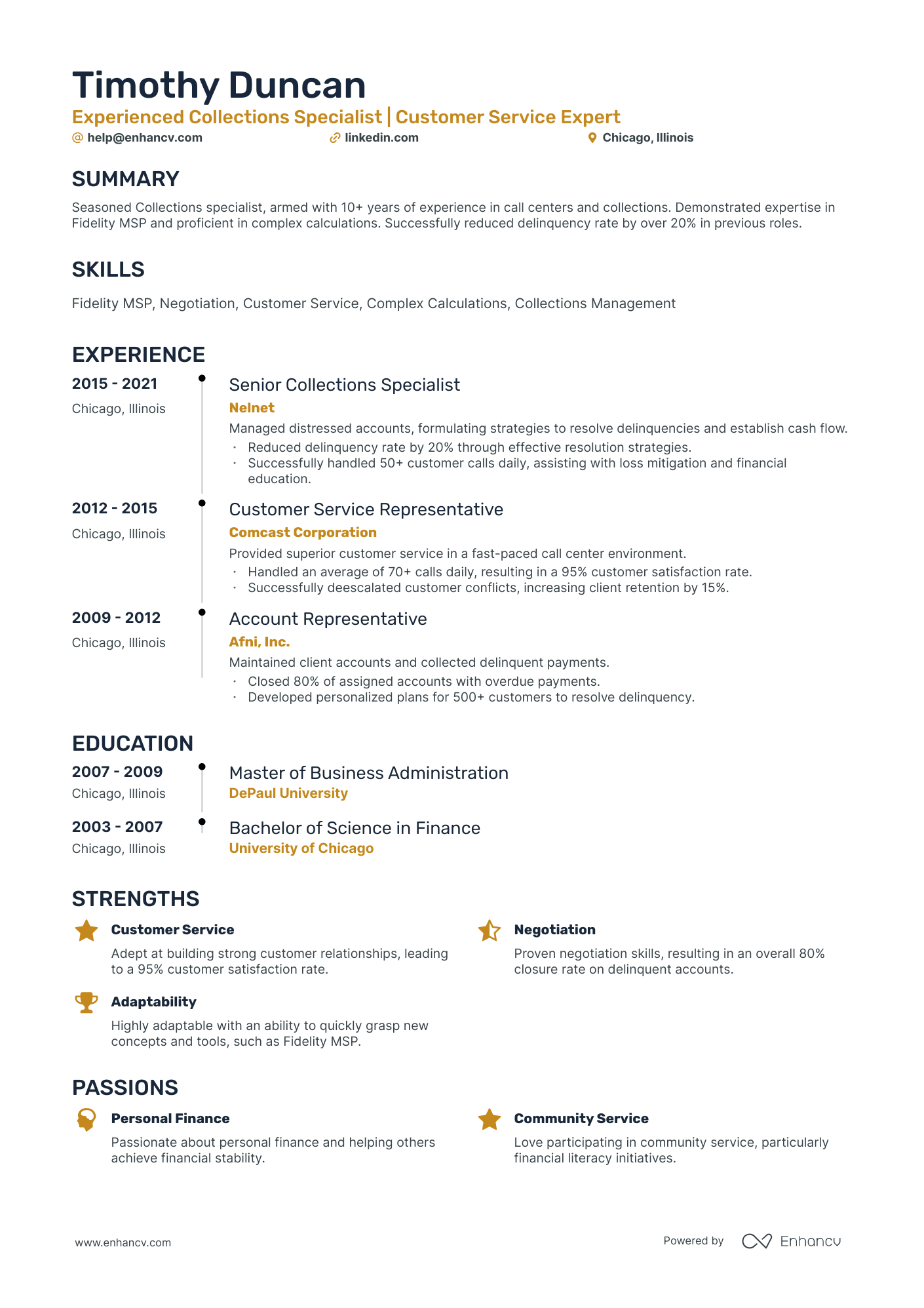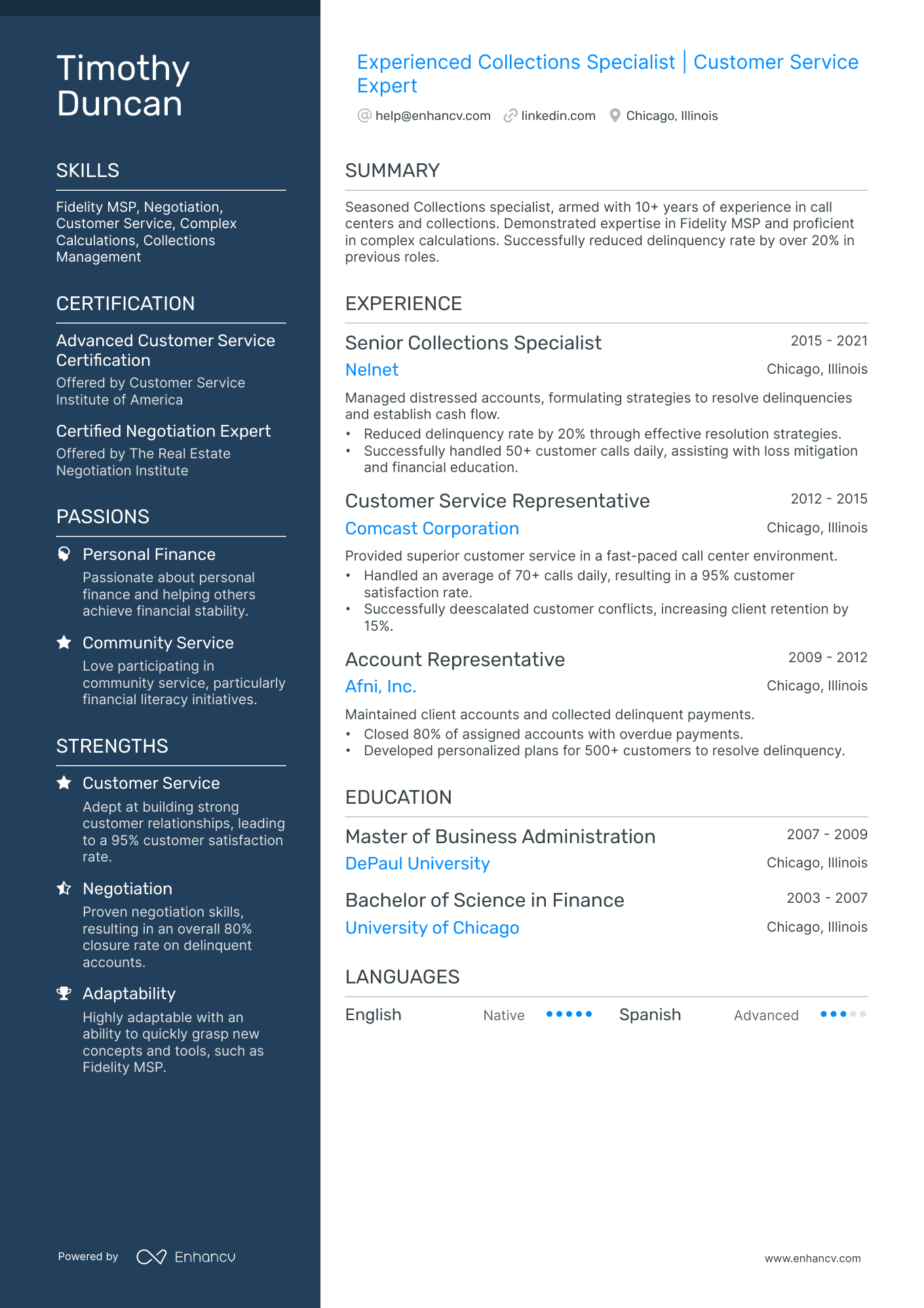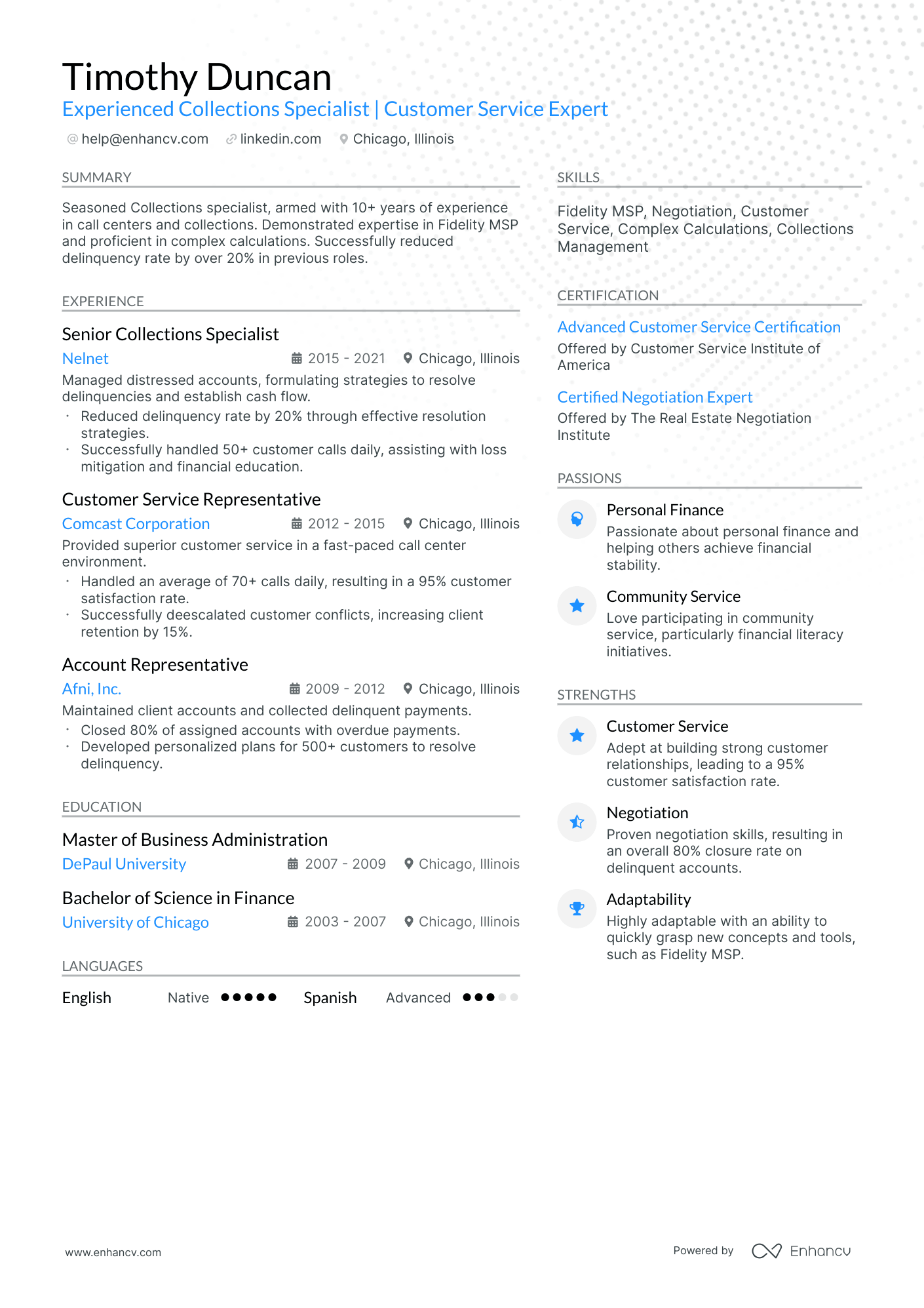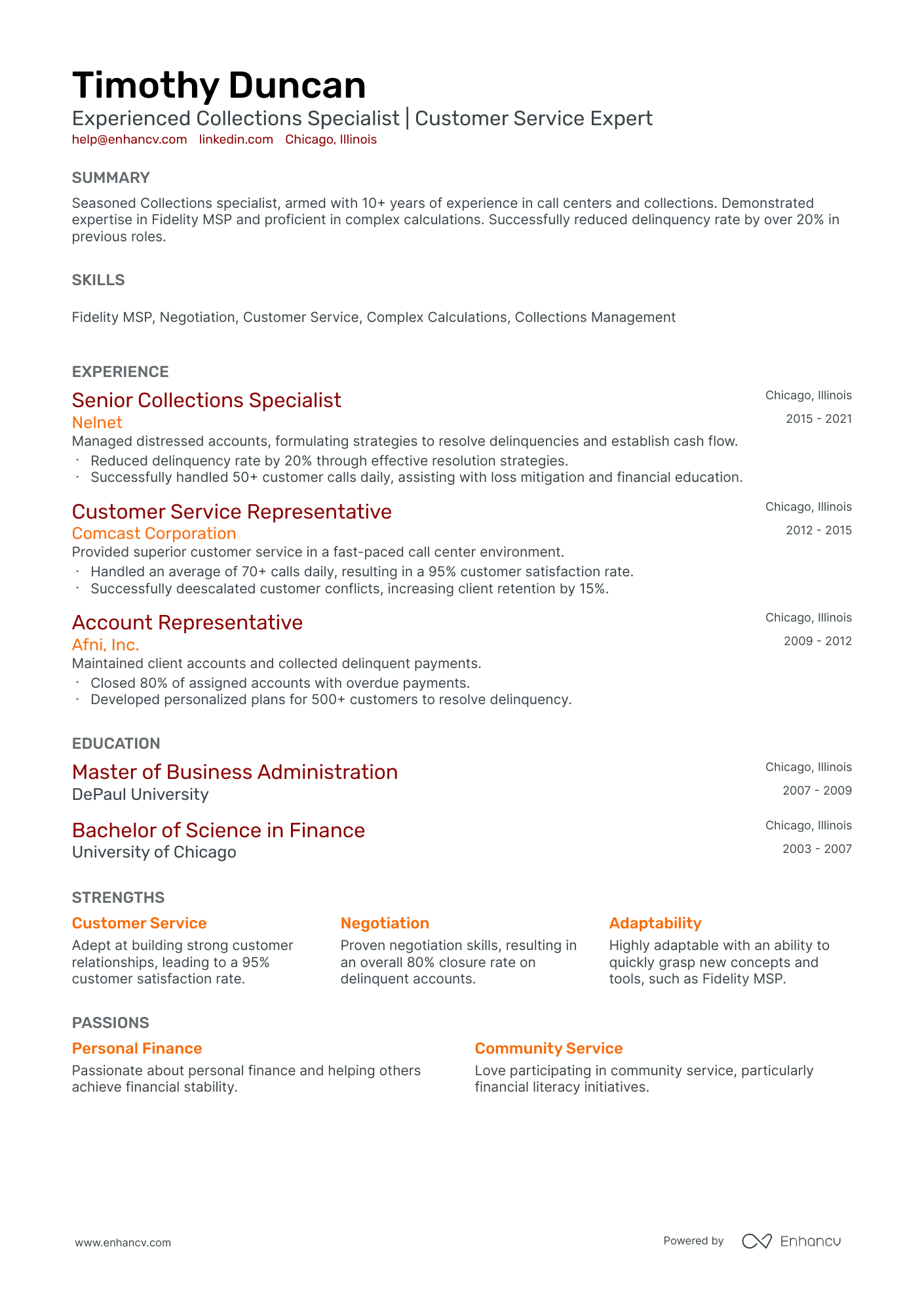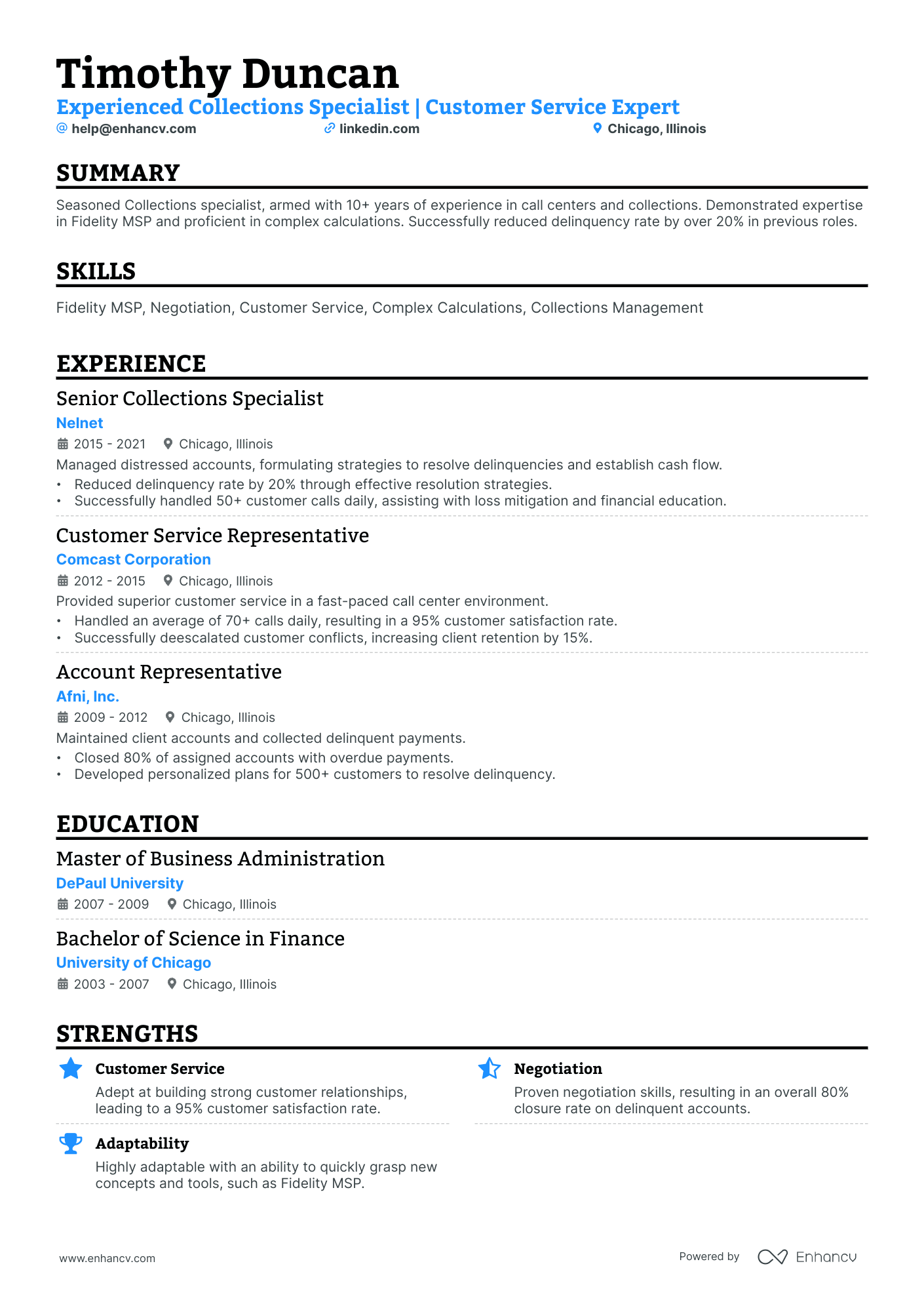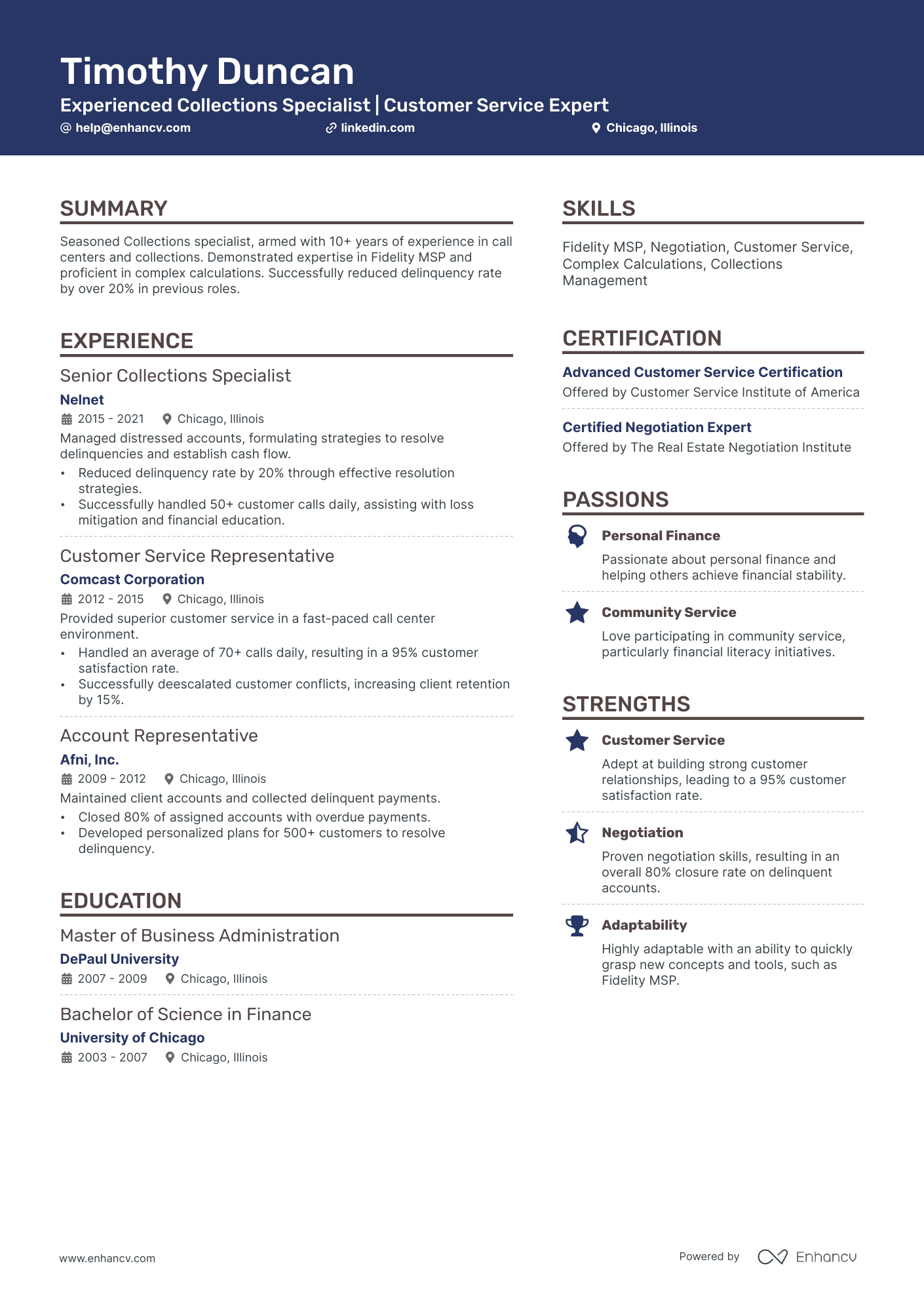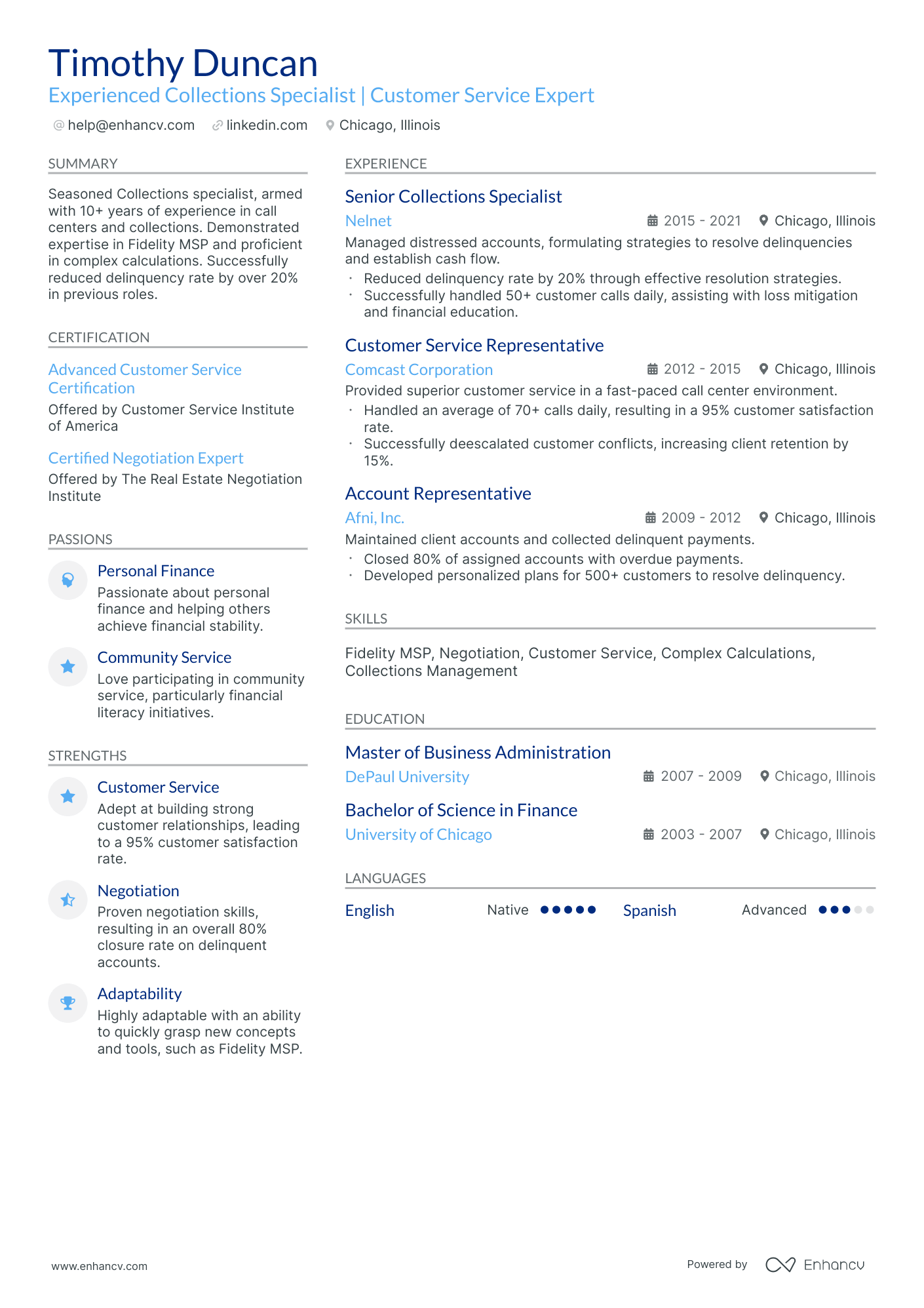Collections specialists often struggle with effectively quantifying their achievements to clearly demonstrate their impact on a company's financial health. Our guide provides specific tips and examples on how to showcase such data-driven results, thereby boosting the appeal and effectiveness of your resume.
Dive into this guide to discover how to craft a compelling collections specialist resume:
- Explore top-tier collections specialist resume samples, spotlighting industry-leading skills and experiences.
- Uncover over ten tailored strategies to make your collections specialist resume resonate with the job description.
- Illuminate your unique value as a collections specialist candidate, using your professional achievements as a guide.
- Debunk the myth that education doesn't matter, and learn how to leverage your academic and certification credentials effectively.
Recommended reads:
Formatting the layout of your collections specialist resume: design, length, and more
When it comes to the format of your collections specialist resume , you've plenty of opportunities to get creative. But, as a general rule of thumb, there are four simple steps you could integrate into your resume layout.
- If you have plenty of experience, you'd like to showcase, invest in the reverse-chronological resume format. This format focuses on your latest experience items and skills you've learned during your relevant (and recent) jobs.
- Don't go over the two-page limit, when creating your professional collections specialist resume. Curate within it mainly experience and skills that are relevant to the job.
- Make sure your collections specialist resume header includes all of your valid contact information. You could also opt to display your professional portfolio or LinkedIn profile.
- Submit or send out your collections specialist resume as a PDF, so you won't lose its layout and design.
The layout of a resume can differ by region – Canadian resumes may use a distinct format.
Upload your resume
Drop your resume here or choose a file. PDF & DOCX only. Max 2MB file size.
Pro tip
Make sure your resume is ATS compliant and catches the recruiters' attention by tailoring your experience to the specific job requirements. Quantify and highlight why you're the best candidate for the role on the first page of your resume.
Essential components for your collections specialist resume:
- Header: Feature your name prominently. If you have a notable degree or certification, append it next to your name. Include contact details, a link to your portfolio, and a concise headline.
- Summary or Objective: Align your professional trajectory and standout achievements with the desired role.
- Experience: Craft concise bullet points, highlighting tangible successes and contributions.
- Skills: Showcase them throughout your resume and consider a dedicated sidebar for emphasis.
- Education & Certifications: Reinforce your credibility and demonstrate your commitment to the industry.
What recruiters want to see on your resume:
- Experience in Collections: Prior experience working in debt collection or similar roles, showcasing your knowledge of the processes and regulations involved.
- Negotiation Skills: Evidence of strong negotiation skills, as collections specialists must regularly negotiate payment plans and settlements with customers.
- Communication Skills: Exceptional written and verbal communication abilities are crucial, as this role often involves addressing customer queries and concerns.
- Knowledge of Collection Laws: Familiarity with local and national debt collection laws to ensure that all procedures adhere to legal requirements.
- Detail-Oriented: Demonstrated attention to detail, as this role requires accurate record-keeping and tracking of customer accounts.
Recommended reads:
Optimizing the experience section of your collections specialist resume
The experience section is pivotal—it bridges the gap between your qualifications and the job's requirements.
To craft an impactful collections specialist experience section, consider these guidelines:
- Review the job posting to identify key requirements and align your past roles with these needs.
- Go beyond listing skills—demonstrate their impact through quantifiable achievements.
- Exclude roles that don't enhance your application or showcase relevant skills.
- While technical expertise is crucial, also highlight soft skills that add value to your role.
- Use action verbs to articulate your accomplishments and the skills employed to achieve them.
Below, we've provided collections specialist resume samples to inspire your experience section, ensuring it adheres to industry best practices.
- Conducted thorough research and analysis of delinquent accounts, resulting in a 25% increase in successful collections
- Negotiated payment arrangements with customers, resolving over 200 outstanding accounts
- Implemented a streamlined collections process, reducing average collection time by 20%
- Managed a portfolio of 500+ delinquent accounts through outbound calls and emails, consistently achieving a monthly target of $100,000 in collections
- Collaborated with legal department to prepare and submit documentation for litigation cases, resulting in a 95% success rate in obtaining judgments
- Developed and implemented training programs for new collections team members, increasing their effectiveness and productivity by 30%
- Utilized advanced skip-tracing techniques to locate debtors, successfully recovering $1.2 million in outstanding debt
- Implemented an automated dialer system, increasing daily call volume by 50%
- Led a team of 10 collectors, providing coaching and performance feedback resulting in a 15% improvement in collection rates
- Developed and executed a strategic collections plan, resulting in a 30% reduction in overall delinquency rate
- Implemented data analytics tools to identify high-risk accounts, improving recovery rates by 20%
- Collaborated with cross-functional teams to implement process improvements, reducing customer disputes by 15%
- Negotiated settlements with creditors on behalf of clients, resulting in an average debt reduction of 40%
- Provided financial counseling to individuals facing debt-related issues, helping them develop personalized repayment plans
- Managed a caseload of 100+ clients, ensuring compliance with regulatory requirements and maintaining accurate documentation
- Conducted investigations into fraudulent accounts, identifying and reporting fraudulent activities resulting in the recovery of $500,000
- Collaborated with law enforcement agencies and legal counsel to initiate legal actions against fraudsters
- Assisted in the development and implementation of fraud prevention strategies, reducing fraud losses by 25%
- Managed a team of 15 collectors, providing guidance and support in resolving complex collection cases
- Analyzed credit risk data and implemented risk mitigation strategies, resulting in a 15% reduction in bad debt write-offs
- Developed and delivered training programs on compliance and regulatory guidelines for the collections department
- Collaborated with external collection agencies to recover outstanding debts, achieving a recovery rate of 90%
- Managed accounts receivable aging reports and initiated collection actions for overdue accounts
- Implemented a customer retention program, reducing delinquency rates by 20%
- Conducted financial analysis and credit assessments to determine risk levels of accounts, resulting in better-informed collection strategies
- Implemented a cloud-based collections software system, improving efficiency and reducing manual errors by 30%
- Collaborated with sales teams to develop credit policies and procedures, ensuring alignment with business objectives
- Performed skip-tracing techniques to locate and contact customers with delinquent accounts, resulting in a 50% increase in successful collections
- Assisted in the development and execution of collection campaigns targeting high-risk accounts
- Maintained accurate records of collection efforts and updated account information in the system
The following content includes information from "O*NET OnLine" by the U.S. Department of Labor, Employment and Training Administration (USDOL/ETA). Used under the CC BY 4.0 license. The data represents the top responsibilities present on the task lists for collections specialist professionals.
Top Responsibilities for Collections Specialist:
- Send notices to taxpayers when accounts are delinquent.
- Confer with taxpayers or their representatives to discuss the issues, laws, and regulations involved in returns, and to resolve problems with returns.
- Notify taxpayers of any overpayment or underpayment, and either issue a refund or request further payment.
- Maintain records for each case, including contacts, telephone numbers, and actions taken.
- Contact taxpayers by mail or telephone to address discrepancies and to request supporting documentation.
- Answer questions from taxpayers and assist them in completing tax forms.
- Collect taxes from individuals or businesses according to prescribed laws and regulations.
- Determine appropriate methods of debt settlement, such as offers of compromise, wage garnishment, or seizure and sale of property.
- Check tax forms to verify that names and taxpayer identification numbers are correct, that computations have been performed correctly, or that amounts match those on supporting documentation.
- Examine and analyze tax assets and liabilities to determine resolution of delinquent tax problems.
Quantifying impact on your resume
<ul>
Crafting the experience section for novice collections specialist candidates
Lack of extensive experience doesn't equate to an empty resume. Here's how you can enrich your experience section:
- Volunteer Roles: Community involvement often equips you with valuable interpersonal skills, and sometimes even technical ones, relevant to the job.
- Academic Projects: Highlight significant university projects that contributed to the field, showcasing your hands-on experience.
- Internships: Even short-term internships can be invaluable. If they're pertinent to the role, they deserve a spot on your resume.
- Past Jobs: Even if unrelated to the collections specialist, these roles can demonstrate transferable skills that are beneficial for the position.
Recommended reads:
Pro tip
When detailing your career journey, there's no need to delve deep into early roles. Prioritize what resonates with recruiters. For senior positions, a decade-long retrospective can effectively illustrate your evolution.
Decoding the essence of your collections specialist resume: hard and soft skills
Every job description communicates the desired hard and soft skills. These skills are the backbone of your application.
Hard skills are your tangible, technical proficiencies, often validated through certifications or hands-on experience. On the other hand, soft skills reflect your interpersonal abilities and how you navigate diverse work environments.
To effectively spotlight these skills on your resume:
- Create a distinct section for technical skills, listing the most relevant ones for the job.
- Highlight your strengths by weaving in achievements that underscore specific skills.
- Strike a balance between hard and soft skills to present a well-rounded profile.
- If multilingual, include a language proficiency section, emphasizing the interpersonal advantages it brings.
Stay tuned for a deep dive into the most in-demand hard and soft skills in the industry.
Top skills for your collections specialist resume:
Debt Collection
Account Reconciliation
Negotiation
Payment Plan Management
Skip Tracing
Knowledge of Collections Law
Customer Relationship Management (CRM) Software
MS Office Proficiency
Data Entry Skills
Financial Record Keeping
Communication
Customer Service
Problem-Solving
Empathy
Patience
Assertiveness
Attention to Detail
Stress Management
Negotiation
Time Management
Next, you will find information on the top technologies for collections specialist professonals from "O*NET OnLine" by the U.S. Department of Labor, Employment and Training Administration (USDOL/ETA). Used under the CC BY 4.0 license.
Top technologies for Collections Specialist’s resume:
- Fund accounting software
- Intuit QuickBooks
- Microsoft PowerPoint
- Email software
- Microsoft Outlook
Pro tip
Sometimes, basic skills mentioned in the job ad can be important. Include them in your resume, but don't give them too much space.
Highlighting your educational and certification milestones on your collections specialist resume
While skills alignment is increasingly prioritized, your educational background and certifications still play a pivotal role in establishing credibility.
To effectively present your academic and certification achievements:
- Detail your educational journey, including the institution and duration.
- Highlight recent and relevant certifications, showcasing your commitment to continuous learning.
- Be concise; focus on the skills and knowledge gained rather than exhaustive details.
- If a certification is in progress, mention the expected completion date.
Remember, authenticity is key. If a certification is pending, be transparent about it.
Best certifications to list on your resume
Pro tip
Listing your relevant degrees or certificates on your collections specialist resume is a win-win situation. Not only does it hint at your technical capabilities in the industry, but also at a range of soft skills, including perseverance, adaptability, and motivation.
Recommended reads:
Summary or objective: making your collections specialist resume shine
Start your resume with a strong summary or objective to grab the recruiter's attention.
- Use a resume objective if you're newer to the field. Share your career dreams and strengths.
- Opt for a resume summary if you have more experience. Highlight up to five of your top achievements.
Tailor your summary or objective for each job. Think about what the recruiter wants to see.
Resume summary and objective examples for a collections specialist resume
Optimize your resume summary and objective for ATS
Drop your resume here or choose a file.
PDF & DOCX only. Max 2MB file size.
Additional sections to elevate your collections specialist resume
Recruiters often seek candidates who offer more than just the basics.
To stand out, consider adding:
- Interests: Share hobbies or activities that reveal your personality and transferable skills.
- Projects: Highlight innovative work that showcases your expertise.
- Languages: If communication is vital for the role, showcase your linguistic abilities.
- Awards: Feature significant recognitions that underscore your expertise.
Key takeaways
- A clear resume layout helps present your info well.
- Use all main resume sections to show how you fit the job.
- Detail specific skills or tasks and their impact.
- Show your personality through interests or hobbies.
- List certifications to back up your technical skills.
